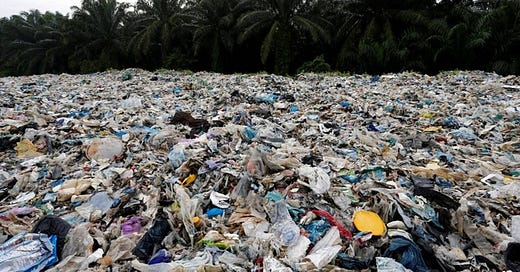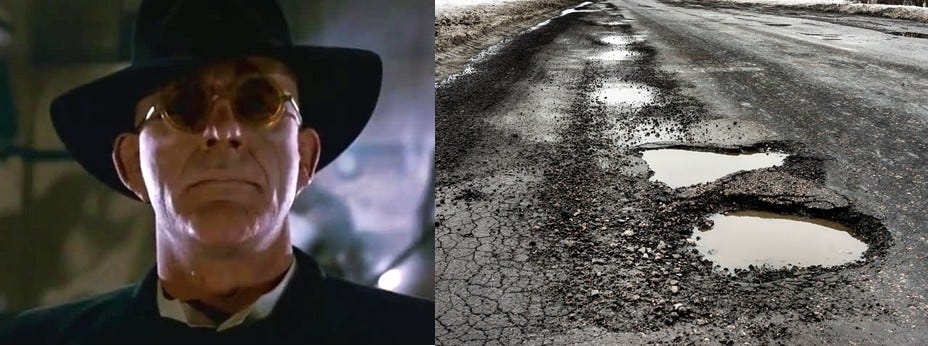“Every sunset brings the promise of a new dawn” - Ralph Waldo Emerson
With each post here we're edging towards a system of government that is a true democracy and doesn't fall into the traps that our current systems so evidently have.
The sun is setting on our current democracies and we're going to have to find something to replace them. Whether that's good or bad is entirely up to us.
I believe that at some point in the not-too-distant future we're going to find ourselves immersed in civil unrest and possibly worse. If there's a carefully thought out alternative waiting in the wings then we can defeat the demagogues who will in the chaos doubtless pronounce themselves the saviours of our way of life.
Just maybe we can avoid another thousand years of darkness.
That's why this column exists.
Panocracy should be more than just talk, though. To be credible it has to have demonstrated that it can work in real life rather than just on the drawing board. The proof of the pudding …
I'll be investigating how to do this in future posts. IT will of course play a big part at least at the start and so this time we're looking into the mixed blessing that is the internet.
The double-edged sword
“Life in plastic, it's fantastic” - Aqua, Barbie Girl
Plastics are a great invention. Unless you live in Malaysia.
Fire is a great invention. Until your house burns down. Nuclear power is a great invention. Until your reactor melts down.
Ever since our ancestors discovered fire, technology has been both our saviour and our nemesis.
Technology has also ratcheted up our reliance on it in a never ending spiral of dependence. You've got a car? Then you must have a smooth road to drive it on! You have a nice smooth road there, sir, but it's got so busy that we need to install lots of technology to control the traffic. If that doesn't fix the problem, and trust me, it won't, then we'll mandate some kind of IT widget that'll stop you using your car at peak times.
The Library of Babel
Jorge Luis Borges' 1941 short story tells of a library in which each book has 410 pages and each page is filled with some combination of 25 letters, including space, comma and period. It doesn't say how many characters there are per page but 1800 seems to be a reasonable number, so each book has 738000 characters. There are an awful lot of books in the Library of Babel - 10 raised to the power 1,031,679 or so.
So there's a book that consists entirely of the letter A repeated 738000 times, and lots of books which contain Romeo and Juliet word for word (24,545 words).
There's a collection of books that has your life history in complete detail - including the bits you haven't lived through yet.
The books in the library contain every truth and every lie that has ever been or will ever be told.
The problem is finding the books that are useful: those which tell the truth. There's so much gobbledegook that your chances of doing so are vanishingly small. Even if you come across the answer to Life, The Universe and Everything, how will you know? Next week's winning lottery numbers are in there somewhere but so are all the losing numbers (the books have numbers written as 'three' rather than '3'). You have no way to determine which is true.
This sounds a bit like the internet, and, come to think of it, a bit like all the words that have ever been written. There may be some deep truths on dusty old shelves somewhere but finding them is another matter.
Unlocking the gates of Heaven ...
At the start, the internet was used in academia for exchange of scholarly works. If only we hadn't opened that Pandora's box!
Improvements in the speed and size of computers meant they could first handle images, then music, then video. The communications hardware also got a lot faster because of ingenious engineering. Search engines were invented and everyone can now look up the meaning of words like synecdoche that we learned at school and quickly forgot.
How wonderful for writers, thinkers and journalists (many of whom seem to be neither nowadays), or hacks, if I may use a synecdoche.
Some were happy to use the internet for the undoubted treasure house of information it became; others smelled a marketing opportunity and begat internet 2.0, social media.
The battle commenced for the hearts and minds of the great unwashed.
… and the gates of Hell
The internet is a lot smaller than the Library of Babel but still contains many truths, many lies, a load of total tosh and much of what's in between. As with Babel's books, you can't tell which is which.
Your biases (see previous article) will help you decide. In many - if not most – cases. Faced with information you can't verify they're all you have.
Despite its early promise as an enabler of information exchange, mainly in academia, the internet has become perverted by political and commercial forces. We've mentioned the Cambridge Analytica scandal before but it was just a drop in a vast ocean of gaslighting, propaganda, misinformation and downright lies that became apparent during the madness of 2020 and after.
Many people think that a lie is a statement that disagrees with their own opinion. They'll even lock people in internment camps or go to war over such things.
Suppressing dissent has gone on for time immemorial but the internet is just a faster way to make people you disagree with into liars and yourself into a fool for doing it.
The former executives of Twitter are clearly among them as they collaborated with government agencies to shut down dissenting voices.
Recent testimony to a US House Judiciary Committee by investigative journalists Matt Taibbi and Michael Shellenberger exposed the level of state and private interference just in Twitter.
Here's an extract from what they said:
“... I would note that the evidence of Twitter-government relationship includes lists of tens of thousands of names on both the left and right. The people affected include Trump supporters, but also left-leaning sites like Consortium and Truthout, the leftist South American channel Telesur, the Yellow Vest Movement. That, in fact, is a key point of the Twitter Files: that it's neither a left nor right issue”
And there's more to it even than that. Taibbi writes about the Virality Project
“This story is important for two reasons. One, as Orwellian proof-of-concept, the Virality Project was a smash success. Government, academia, and an oligopoly of would-be corporate competitors organized quickly behind a secret, unified effort to control political messaging”.
You might ask yourself why institutions who claimed a monopoly on the truth (touted as 'The Science') would be in the least bit afraid of objections to their narratives. So afraid in fact that they commissioned research into who these dissenters were and how to silence them.
The report they commissioned is now available online and names are given. Ask yourself if it’s a good thing to do with public money.
Panocracy and the Internet
The internet, or rather part of it, is a highly desirable tool for our panocracy which enables the constant and unbiased representation of the views of everyone.
We have a couple of questions ...
Could votes be rigged?
In the panocracy this would the equivalent of election rigging and so would be considered a heinous crime.
Whether election rigging is a crime or not at the moment rather seems to depend on who is doing it.

On the other hand, Donald Trump's 2016 Victory was attributed by his Democratic Party opponents to Russian hackers.
All of which goes to show that you can't trust politicians to tell the truth about anything, but especially elections they've just lost.
Voting 'irregularities' at the moment are assumed to occur but on such a small scale that it doesn't matter. I have no evidence to suggest anything else but let's assume that, even though no one does it just now, someone would try to alter votes in the panocracy.
We can imagine that with sufficient ingenuity, systems could be hacked. But the millions of panocracy votes are handled by many agents all of whom are constantly under surveillance by their customers, activists and any state agencies that happen to be charged with monitoring them. These are the very people whose votes the agents are placing and someone is going to notice very quickly that their vote is different from what they would have expected. A flood of complaints especially on a contentious issue would ensue. A sort of Jan 6 without the warpaint.
This is the difference between what we have now where you never get to see how you actually voted and the panocracy where it's open to you as a matter of course.
So vote rigging would be detected and - importantly - there's a big incentive to do so for those involved in the running of the system rather than the opposite, which is the case at the moment. There are many different and competing agents rather than just one administrative department that's funded by the vested interests of party politics.
Could dissenters be shut down?
The short answer is no. The whole system revolves around different opinions (as ought to be the case in our current democracies but isn't). It's only by dissent and reasoned (and occasionally unreasonable) debate, that problems are spotted and fixed before people start dying in excess numbers.
If the views of a particular group gain traction in a panocracy then it's because they have merit and if they lose ground it's because they don't.
Setting up organisations to advise on how to denigrate such views, not on the basis of their merit but simply because they aren't your views, is a characteristic of religion, not reason.
If everyone reads only the book that contains just the letter A, then who would ever discover Romeo and Juliet?
Next time we'll say a little about how we might progress the great – but currently insignificant – enterprise that is Panocracy.
As always, if something’s not clear or you disagree, please comment. There’s no such thing as a silly question even though the world is littered with silly answers.





